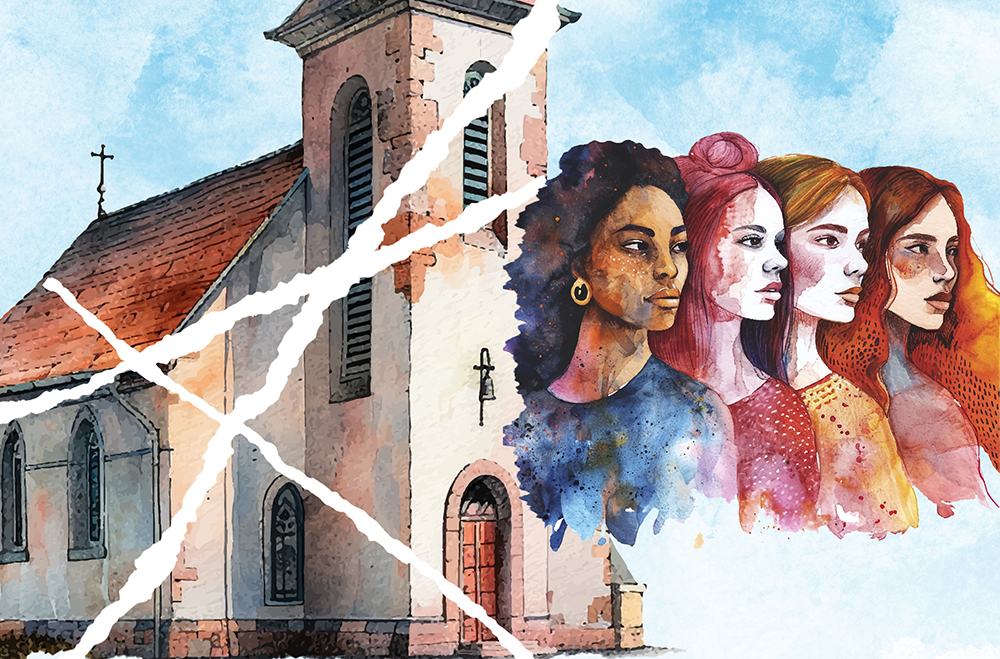
For Caitlin Mayifilua of Columbus, Ohio, the results of last month's presidential election are personal. She lives about 45 minutes from the community of Haitian immigrants Donald Trump falsely accused of stealing and eating pets, and some of her friends and coworkers are Haitian.
During his first term, when Trump referred to immigrants from Africa as coming from "shithole countries," he was talking about people like Mayifilua's husband, who is from the Democratic Republic of the Congo. She worries that a second Trump term will be a "direct threat" to her husband and toddler daughter.
Twenty-seven-year-old Mary of Tennessee is fearful of getting pregnant while Trump is in office. Last year she suffered a miscarriage that required two doses of an abortion pill to complete. "I live in a red state, so I'm scared about the same thing happening and not being able to access the care I need," said Mary, who asked that her last name not be used to protect her job.
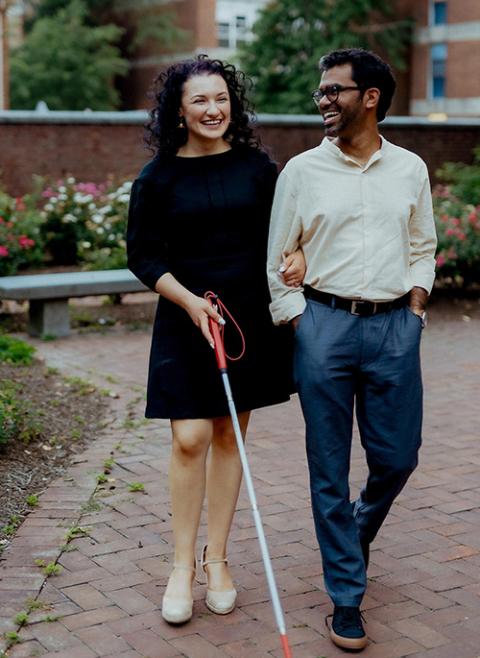
Hannah Anderson, shown with her husband, feels out of step with other Catholics after the election. (Colleen Stepanian Photography/Courtesy of Hannah Anderson)
Hannah Anderson of Philadelphia is worried about plans by Trump and his allies to make changes in health care protections, such as Medicaid and the Affordable Care Act, which are essential for disabled people like herself.
For all three of these Catholic women, their concerns and fears are compounded by the news that a majority of their fellow Catholics supported the Trump ticket, a marked increase from the percentages of Catholics who voted for him than in the two previous elections. Catholic Trump supporters also seemed more vocal about their views this time around, women told NCR.
Anderson wonders: "Do they have any idea the way their political beliefs are going to harm their Catholic brothers and sisters?"
Some exit polls, updated weeks after the election, estimate that 59% of Catholics opted for Trump over Vice President Kamala Harris — an increase of nine percentage points from the 2020 race. The percentage of white Catholics voting for Trump in 2024 was even higher, over 60%. Trump also made gains among Latino voters, many of whom are Catholic.
There also was a clear gender gap, with men supporting Trump more than women. And now there is a growing gender gap in churches, too, with Gen Z women leaving their childhood religion at a greater rate than men.
Headlines in conservative media about an "historic Catholic vote" helping to deliver the presidency to a man found liable by a jury for sexual abuse have women questioning whether the church practices what it preaches about the dignity of all human beings. And for some, it solidifies a connection they may have already felt: that neither the country, nor their church, is ready for women leaders at the top.
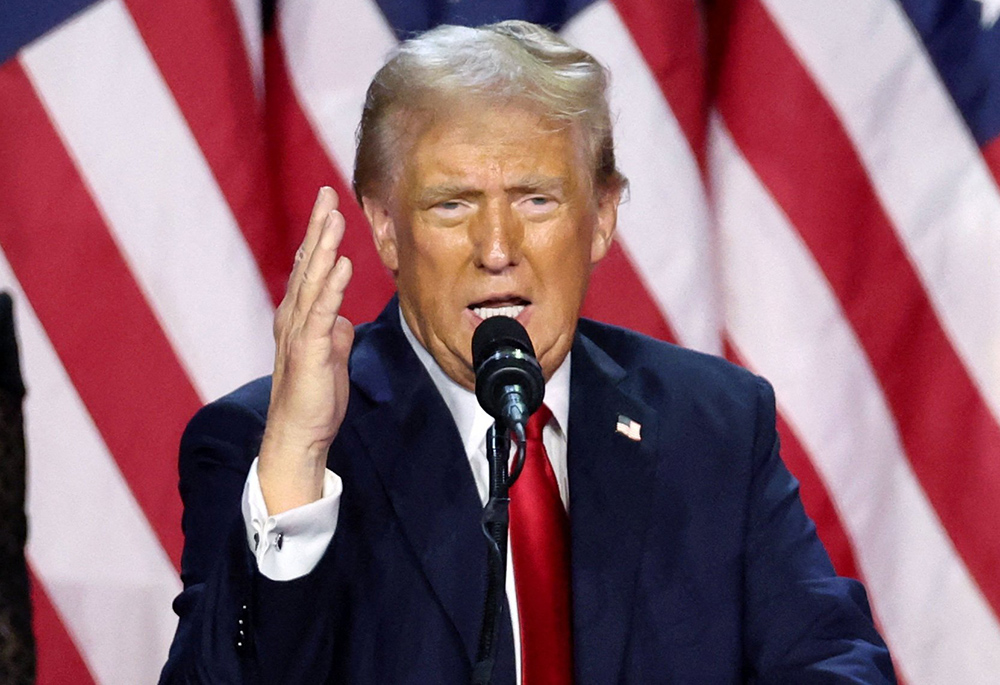
Republican President-elect Donald Trump addresses supporters during his rally at the Palm Beach County Convention Center Nov. 6 in West Palm Beach, Florida, after being elected the 47th president of the United States. (OSV News/Reuters/Brendan Mcdermid)
Nine days before the election, the Catholic Church concluded its yearslong synod on synodality — a process that raised hopes that some action may be taken on the issue of women's leadership in the church, perhaps restoring women to the diaconate. But the final synod document punted on the issue, leaving many women angry, hurt and disappointed.
For some, after a lifetime of experiences of sexism, the election was the final straw. Others — particularly younger women who may have grown up in more conservative households and don't necessarily follow internal church debates — saw the election results as a wake-up call, alerting them to the prevalence of right-wing ideologues in the U.S. church.
'Do they have any idea the way their political beliefs are going to harm their Catholic brothers and sisters?'
—Hannah Anderson
A growing connection of Catholicism with Trumpism has these women reevaluating their relationship to the church. They told NCR that it may mean taking a break from going to Mass, reconsidering their donation priorities or hesitating to tell people they're Catholic, since the identity now seems to come with so much political baggage. While some ultimately have decided to stick with — and even commit further to — their local progressive parishes, others are asking themselves whether it's worth it.
Moral theologian Meghan Clark of St. John's University in New York believes many Catholic women are shocked and angry at how Catholic leaders normalized Trump with their support. "Someone who has been shown in court to be a sexual predator, who has committed rampant fraud and who tried to incite the rejection of a fair election — that that's acceptable to more than 50% of my fellow Catholics in this country — I don't know how we are part of the same community," she said.
Gut punches
On the night of the election, as it became clear that Trump was going to win the presidency, Katherine Schmidt emailed her parish and asked them to take her off the lector schedule.
"I just couldn't …" said Schmidt, associate professor of theology and religious studies at Molloy University in New York.
After the 2016 election, she also stopped going to Mass for about a year. While she is careful to say that she hasn't lost faith in Jesus, she has lost some faith in the church.
She's not alone. When NCR posted a request for women willing to be interviewed for this story, we were deluged with volunteers. Many described the election results as feeling like a "gut punch."
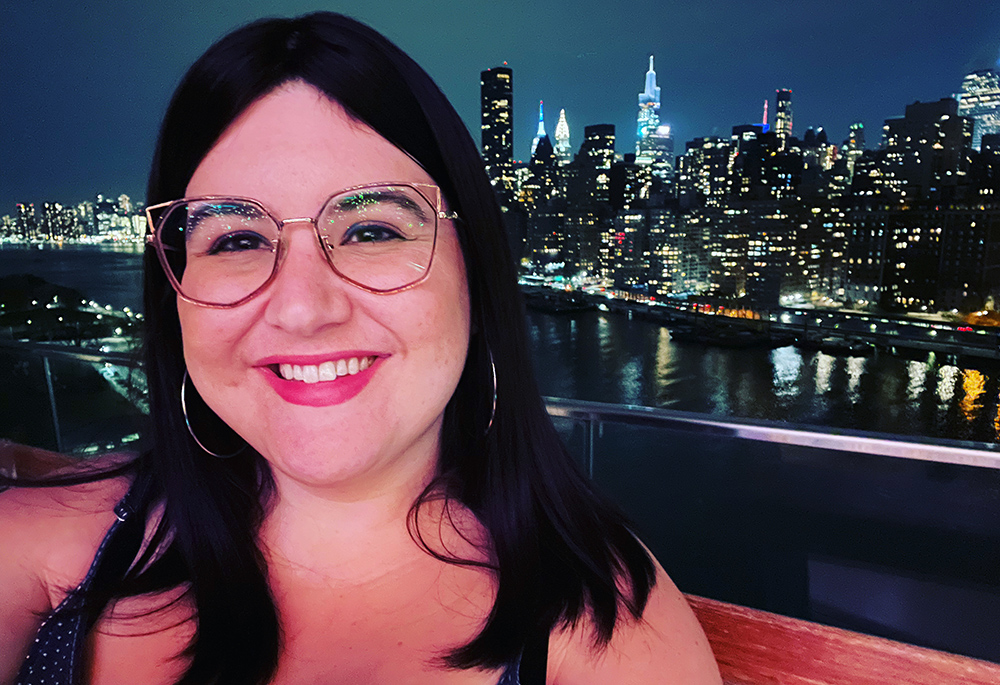
Katherine Schmidt hasn't lost faith in Jesus, but she says she has lost some faith in the church after the election. (Courtesy of Katherine Schmidt)
Schmidt says she will always identify as Catholic, but there is a practical issue with belonging to a parish and attending Mass there. "You want to feel connected to the people around you," she said. "When people are demonstrating a complete difference in values, it does sort of make you question whether they are hearing the same Gospel as I am — and whether you still belong."
For women who work for the church or church-related institutions, the personal also becomes professional.
Kathleen O'Brien, who works in ministry in northern California, said the election results have her questioning her vocation.
"I don't know if I want to be part of this institution anymore," she said. "As I see it aligning itself more and more with conservative Republican ideology, the Catholic space is no longer a spiritual space for me. It feels tainted by the larger political culture."
Advertisement
O'Brien, who is 32, admits that she had been disillusioned with the church even before the election.
"As a woman working in the church, I feel very stunted," she said, adding that she held out hope that outside of the church, women could reach their full potential.
"Now, with Trump being elected, I've realized that as a woman, I don't have anywhere to go to do what I feel I have the capabilities of doing," she said.
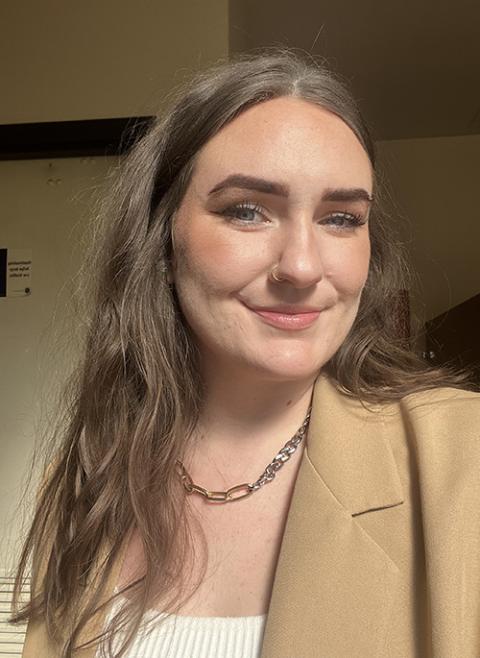
Mary Aaker grew tired of hearing Democrats demonized from the pulpit. She says the election has her feeling "in a tailspin." (Courtesy of Mary Aaker)
Mary Aaker of Kansas City, Missouri, grew up in a more traditional Catholic family. She was homeschooled before attending Benedictine College in Kansas — the college that made headlines in May when Kansas City Chiefs kicker Harrison Butker delivered a controversial, traditionalist graduation speech.
After college, Aaker's friend groups became more diverse. During the past two elections, she was shocked that some of the most racist comments she saw on social media came from outwardly devout Catholics. She also tired of the demonizing of Democrats from the pulpit.
"That was the switch for me," said Aaker, who is 27. "I don't think we are practicing the same faith. I don't even know if we love the same God."
She is not leaving the church, but she sees herself as on a path of "deconstructing" her faith, questioning what is healthy and life-giving and what is not. The election left her feeling "in a tailspin," but she is committed to "diving deeper into my relationship with Christ" in a way that can bring peace and healing.

Mattie McClane (Courtesy of Mattie McClane)
For Mattie McClane of Davenport, Iowa, it wasn't just Catholics' support of Trump but also the church's own attitudes toward women. When Pope Francis told television host Norah O'Donnell that he opposed restoring women to the diaconate, it was like a "gut punch," she said. A few months later, the synod meeting in Rome concluded without action on women's leadership.
She had already been considering stopping her donations to the two parishes she helps support. "It seemed like the only thing that was available to me," said McClane. "I don't want to give up my religion, but I feel something more has to be done than talk."
She wrote to the parishes and other Catholic organizations, explaining why she was withdrawing her donations. "It's not a lot of money, relatively speaking," she said. "But I think women need to express themselves through their finances, because it seems that that's the only thing the patriarchy really understands."
Survival strategies
The synod and the election didn't just happen around the same time. They both represent "systems of hierarchy that benefit from the subjugation of women," according to Madison Chastain, who works as a freelance communications manager for nonprofit organizations.
"I feel there's a woman-shaped hole in the Catholic Church and now I can't unsee it," she said. "And I wish America could see that there's a woman-shaped hole that's missing from our government and our democracy."
Chastain initially avoided Mass at her Chicago parish after the election because it felt like "complicity" in those hierarchical systems. She also felt the need to balance her activism with rest.
'I feel there's a woman-shaped hole in the Catholic Church and now I can't unsee it.'
—Madison Chastain
But eventually she realized she wanted to get back to her "real community," after months of online reading political news and social media about national issues. Chastain and her husband plan to get involved in some of her parish's many ministries, maybe the community garden or food pantry.
"There are still things we can do to make the world a better place," she said.
Twenty-four-year-old Gabi Jeakle also plans to focus on her progressive parish in Seattle. And as a person of Latino descent, Catholicism will always be part of her identity, she said.
She had been able to forgive the church its limitations — the lack of representation of women in leadership roles, for example. But she can't deny that the election results were upsetting. "Seeing how many Catholics willing to vote for someone who has said horrific things about women and assaulted women — that was so disappointing," said Jeakle, who campaigned for Harris.
"For the first time I've been reckoning with how do we fit into a church that doesn't seem to want us there," she said.
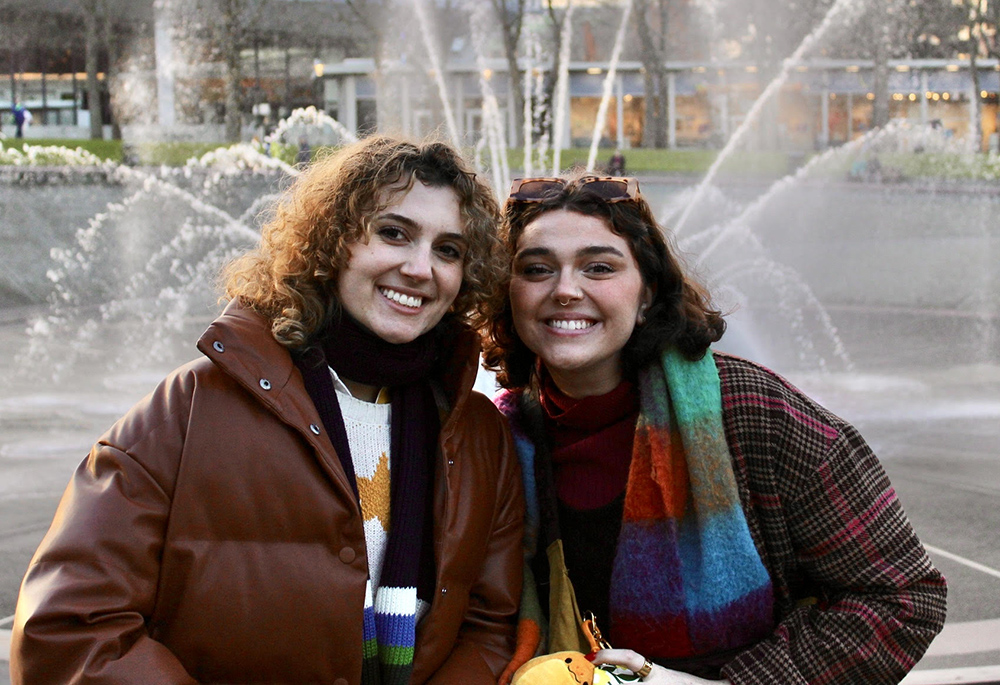
Gabi Jeakle, shown with her sister, Siena (left), says as a person of Latino descent being Catholic will always be part of her identity. But after the election, she was disappointed that fellow Catholics voted for Trump and wonders whether she fits in the church. (Courtesy of Gabi Jeakle)
Those with positive, local experiences of church know that their situation can change quickly. Anderson's Philadelphia parish had been welcoming, especially of people with disabilities, such as herself. But the pastor was replaced by a more conservative priest who made political comments from the pulpit.
That, combined with the election results, has Anderson feeling like it's not the same church she converted to 12 years ago. She feels "out of step" with other Catholics.
"At least in America, increasingly there's one way to be Catholic — one set of beliefs or value systems that every Catholic is supposed to have. They are very conservative and feel like they're really in tension with the theology of the church, especially around immigration," she said.
"It really excludes people like me who don't share the same political beliefs, but really love the same Catholic tradition."
Clara Rico, an American who lives in Colombia, South America, says she is confused by how so many Catholics came to the conclusion that Trump could best represent them as president, given his intolerance, especially of immigrants.
"It doesn't jive — the math just doesn't work out," she said. "How can we get to such different positions?"
Trump supporters who have been more open — even bold — about their views have Rico realizing that some Catholics who have been instrumental in her faith journey are "full MAGA."
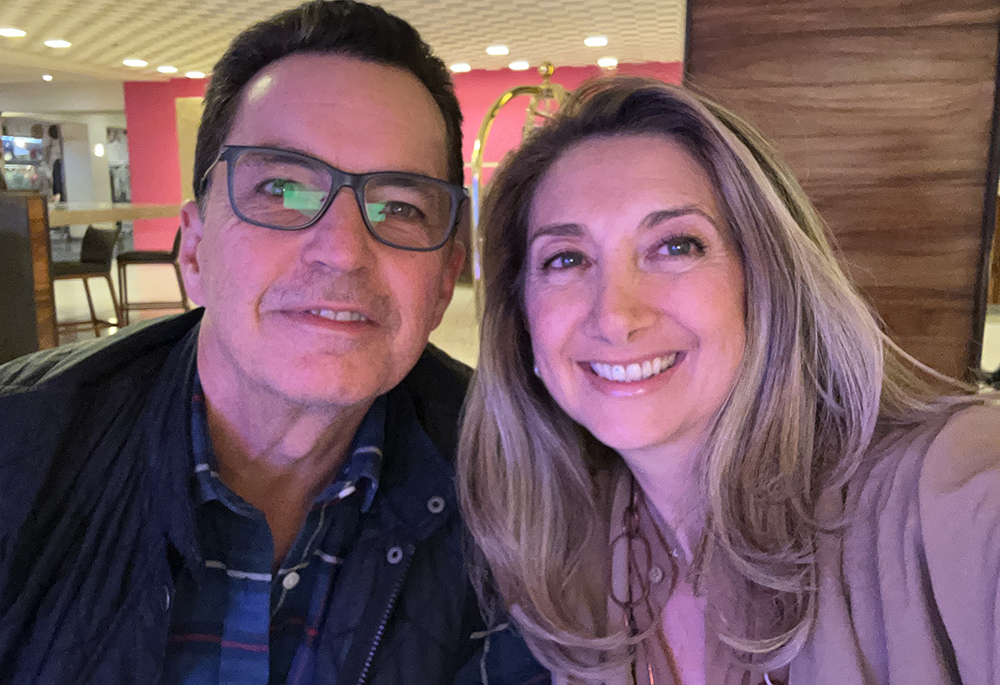
Clare Rico, shown with her husband, Michael Adams, realizes that some Catholics who were instrumental in her faith journey are "full MAGA." But she plans to focus on her local community of faith. (Courtesy of Clare Rico)
Yet she feels comfortable in her local communities and plans to focus on that. "I love my faith," she said. "I would never leave it."
Kansas City Star columnist Melinda Henneberger tried giving up on the church after the sex abuse scandal involving former Cardinal Theodore McCarrick in 2019. She even penned a piece for USA Today, headlined, "Can you be a former Catholic? With new betrayal on child sex abuse, I'm about to find out."
What she found out is that she missed it. "I never stopped being Catholic," she said. "I was furious beyond belief, and rightly so. I don't take a word of it back."
But she never stopped believing in God, or praying her rosary, and when parishes started livestreaming Masses during COVID-19, Henneberger watched services from her former parish in New York City.
But it was Trump's election that actually prodded her into joining a local parish in Kansas City. "I realized I needed to live my faith in community right here," she said. "I'm never going to be happy with how the hierarchy works, but if I'm not in community, it doesn't really make any sense."
Mary from Tennessee, who miscarried last year, couldn't bring herself to attend Mass after she saw Catholics celebrating Trump's victory. "Maybe I'll feel more comfortable to ease back into church as the political rhetoric dies down," she says.
On the one hand, she believes "Catholic" will always be part of her identity. But in another way, it no longer seems to fit. "At this point in life, I'm questioning how I want to raise my children," she said. "I'm not sure what their faith is going to look like."
Mayifilua is still drawn to the Eucharist, but has become increasingly frustrated with church leaders who refuse to speak out about global issues. "When you have so many negative experiences in a row, you wonder why you're still there and if there's no reason to stay."







